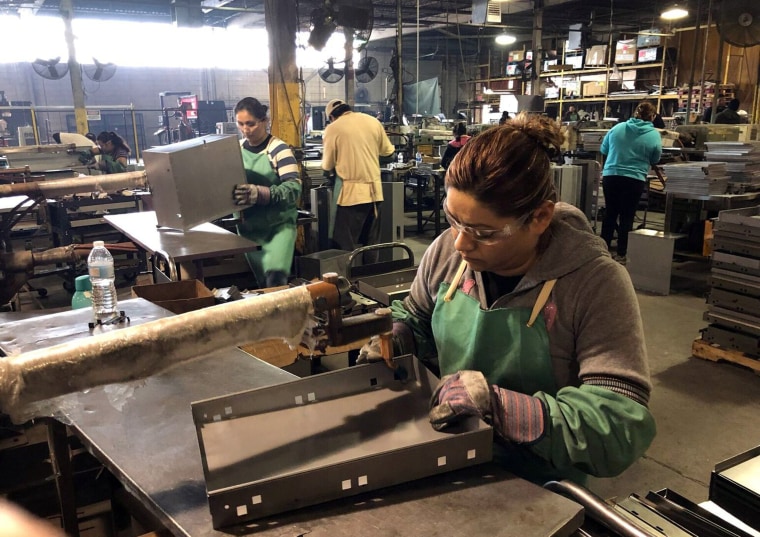President Donald Trump says he is all about jobs, but his trade war could hurt job growth, economists say.
“The history of tariffs is pretty clear, they can create some jobs in the protected industries but then destroy lots of other jobs elsewhere. I’m frankly a little bit worried about it,” said Dan North, chief economist at Euler Hermes North America. “This could undo all the good the tax cuts have done and derail what could the best economy of the recovery.”
The labor market added a higher-than-expected 213,000 jobs in June, with a healthy bump of 36,000 manufacturing jobs. However the increased uncertainty brewed up by the trade dispute could start scaring off companies from investing in more workers.
Economists say the second half of 2018 is likely to be a bumpier ride for the labor market if the administration’s trade policy remains on its current trajectory.
“I think the bigger impact rather than the tariffs, per se, would be the effect on overall economic confidence by businesses and consumers,” said Rob Atkinson, president of the Information Technology and Innovation Foundation. “If they think that tariffs are going to lead to an escalating trade war, than companies may pull back somewhat on their investing plans."
There are indications that this is already happening. The Federal Reserve noted in its June meeting minutes that anxieties about tariffs already are starting to put a drag on corporate investment, saying, “[C]ontacts in some Districts indicated that plans for capital spending had been scaled back or postponed as a result of uncertainty over trade policy.”
So far, the stimulation effects of the GOP’s tax break for companies and regulatory rollbacks are outweighing the detrimental effects of volatile and protectionist trade policy.
“There is no evidence in the ADP data that the tariffs are impacting jobs,” said Mark Zandi, chief economist for Moody’s Analytics, referring to the monthly private-sector payroll numbers the company releases in conjunction with ADP, the payroll-processing firm.
But experts say the question is when, not if, tariffs will become an economic headwind if the increased imposition of tariffs continues apace. The Trump administration raised the stakes on Friday with the implementation of tariffs on $34 billion of Chinese-made goods, to which China said it would retaliate with tariffs on agricultural products and other American-made goods. Trump has threatened to respond with an escalating series of trade sanctions that ultimately could target $550 billion in Chinese imports.
Andy Challenger, vice president at Challenger, Gray & Christmas, said that his company’s data finds that the number of both layoffs and new hires are falling. “On both sides, it’s coming to a standstill,” he said.
Given the overall strength of the American economy, it’s likely that companies are entering this holding pattern because they are wary about what the future holds, Challenger said. “We wouldn’t have expected that drop-off, unless companies felt some uncertainty going forward.”
But a robust amount of turnover in the job market is good news for workers because people typically make more money when they switch jobs — so fewer opportunities to move means fewer chances to leapfrog stubbornly anemic wage growth, which remained at an underwhelming 2.7 percent on an annualized basis in June.
